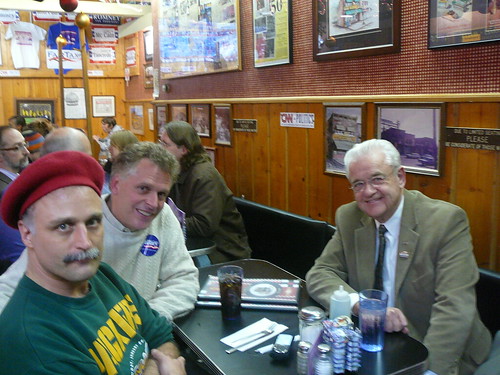The weekend's Wikileaks crisis, with its leak of hundreds of thousands of "secret" diplomatic documents, smacks head on into two of my favorite quandries: honesty in communication and the relentless flow of free information in the digital age.

Diplomacy: Two of these guys are too scared to throw poop at the third guy and want the fourth one to do it for them.
Every human lies every day as a survival tactic. Heck, even apes know how to diplomatically lie -- or, more generously, how to situationally vary their behavior and messages. Every chimpanzee knows you don't mess with the alpha male unless you want a beat-down. You pant-hoot submissively and share your bananas, even if you really want to fling your feces.
 It's part of why "Take This Job And Shove It" topped the charts. Speaking your mind is a powerful fantasy. Yet check that lyric more closely:
It's part of why "Take This Job And Shove It" topped the charts. Speaking your mind is a powerful fantasy. Yet check that lyric more closely:I'd give the shirt right off of my back if I had the guts to say...Despite the proletarian triumph of the chorus, Johnny Paycheck never actually tells the boss off. He's just grumbling about it to his buddies. He has to be... diplomatic.
Take this job and shove it I ain't workin' here no more
Johnny Cash may have actually decked the boss in "Oney," but the song ends before it actually happens... and he's only willing to chance it on the day he retires. Just like I played "Take This Job And Shove It" as the last song of my last shift as a country DJ. (Shocking factoid: the bald lefty blogger with the beret did two years as the long-haired country DJ with a cowboy hat.)
Yet we look down on our political leaders, call them "liars," for behaving just like the rest of us monkeys. Just like Johnny Paycheck, the politicians talk differently in front of the boss -- that would be us -- than in private. The more public the communication, the less direct and honest it becomes.
The striped pants diplomatic set are just like us working stiffs, secretly wishing they could speak their minds. Germany's Merkel is wishy-washy, France's Sarkozy is an idiot, the king of Saudi Arabia wants us to bomb bomb bomb, bomb bomb Iran.
There's a reason country singers and standup comedians are more "honest" than politicians: the stakes are lower. What's just happened, in country music terms, is the diplomats have turned around on the barstools at the union hall and discovered that the foreman has been listening to every word. Only with nukes. Gives a whole new meaning to the term "fired."
There's no such thing as "in private" in the internet age. People know too much about us, but just as important we know too much about them. The person who didn't get the job because of That One Facebook Picture loses, but so does the prospective employer.
We are all Star Trek's Deanna Troi, sensing everyone's thoughts whether we want to or not. We are Superman hearing the whole world's cries for help all at once and having a nervous breakdown.
 Does the world at your fingertips information age mean we have to cope with TMI 24-7? It's a fundamental change in human communication and interaction as it's been all the way back to the trees.
Does the world at your fingertips information age mean we have to cope with TMI 24-7? It's a fundamental change in human communication and interaction as it's been all the way back to the trees. Will our proud species go all de-evolution and sink into the pablum of PR-speak, afraid to risk offending anyone and becoming less as a result?
There's a better answer: healthy acceptance of the truths we don't like to hear.
Near the dawn of the internet age, in 1996 (One Million BC in blog years), MIT's Jeff Bigler came up with the notion of the Geek Tact Filter:
Most "normal people" have the tact filter positioned to apply tact in the outgoing direction. Thus whatever normal people say gets the appropriate amount of tact applied to it before they say it. This is because when they were growing up, their parents continually drilled into their heads statements like, "If you can't say something nice, don't say anything at all!"Perhaps the real importance of Wikileaks is that in the 21st century, we are all geeks, and the Geek Tact Filter our new social framework.
"Geeks," on the other hand, have their tact filter positioned to apply tact in the incoming direction. Thus, whatever anyone says to them gets the appropriate amount of tact added when they hear it. This is because when nerds were growing up, they continually got picked on, and their parents continually drilled into their heads statements like, "They're just saying those mean things because they're jealous. They don't really mean it."
So, nerds need to understand that normal people have to apply tact to everything they say; they become really uncomfortable if they can't do this. Normal people need to understand that despite the fact that nerds are usually tactless, things they say are almost never meant personally and shouldn't be taken that way.
But the real question is, will Ahmedinijad and Kim Jong Il see it that way?



